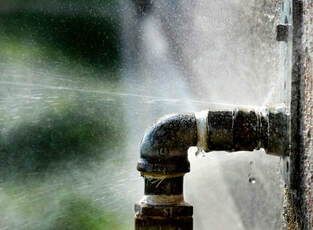Just how to Check If Your Home Has a Concealed Leakage
Just how to Check If Your Home Has a Concealed Leakage
Blog Article
In this article below you can discover some great details relating to Leaking water lines.

Early detection of dripping water lines can minimize a possible calamity. Aside from saving you money, it will certainly minimize the worry as well as disappointment. The minute you locate a leak, calling your plumber for repair work is the most effective remedy. Nevertheless, some small water leaks might not show up. Here are some hacks that aid if you can not discover it with your nude eyes.
1. Analyze the Water Meter
Inspecting it is a surefire means that aids you uncover leaks. If it relocates, that indicates a fast-moving leak. This implies you may have a slow leak that can even be underground.
2. Examine Water Intake
If you detect abrupt changes, regardless of your consumption being the very same, it means that you have leaks in your plumbing system. An unexpected spike in your costs indicates a fast-moving leak.
Meanwhile, a stable rise every month, despite having the same routines, shows you have a sluggish leakage that's additionally slowly escalating. Call a plumber to completely inspect your property, particularly if you feel a cozy area on your flooring with piping beneath.
3. Do a Food Coloring Examination
When it comes to water consumption, 30% comes from toilets. If the color somehow infiltrates your dish during that time without flushing, there's a leak between the tank and dish.
4. Asses Outside Lines
Do not forget to inspect your exterior water lines also. Must water permeate out of the link, you have a loosened rubber gasket. One small leak can waste bunches of water and increase your water bill.
5. Assess the circumstance as well as inspect
Property owners must make it a practice to inspect under the sink counters and also also inside cabinets for any bad odor or mold growth. These two warnings show a leakage so punctual focus is called for. Doing routine examinations, also bi-annually, can conserve you from a major trouble.
If you know your house is already old, maintain a watchful eye on your heating units, hoses, pipelines and so on. Look for stainings and also weakening as most devices as well as pipelines have a life expectancy. They will certainly likewise normally deteriorate because of damage. If you presume dripping water lines in your plumbing system, don't await it to intensify. Call a professional plumber today so you don't wind up with an awful mess in your house.
Early detection of leaking water lines can reduce a prospective catastrophe. Some small water leaks may not be noticeable. Examining it is a proven method that helps you uncover leakages. One tiny leakage can lose heaps of water and spike your water bill.
If you think leaking water lines in your plumbing system, do not wait for it to escalate.
How to Know If Your Home Has a Hidden Leak
Water Meter Reveals Inexplicable Water Usage
If you’d like to test whether or not there’s a leak somewhere in your home, you can do this using your water meter. Here is how to conduct the test:
Don’t use any water in your home for at least 30 minutes; this also means not turning on faucets or water-using appliances.
Go outside, and check your water meter for activity.
If your water meter shows that there was activity, even though no one was using any water, this proves that there is a leak in your home.Visible Mold or Mildew Growth
Leaks behind walls create moist, dark environments that allow mold and mildew to grow and thrive. Eventually, you might see mold growth forming on the wall closest to a hidden leak.
If mold is growing in an area that receives a high amount of moisture, such as a bathroom, it may simply be an indication that better ventilation is needed. However, if you see mold growth on a wall or the ceiling in an area where you would not expect, you probably have a hidden leak.
Musty, Mildew Odor
Sometimes you might not be able to see the mold or mildew that is growing as a result of a leak. However, the smell can give the problem away just as easily. If you catch a whiff of something musty, there’s a good chance that old water is collecting somewhere in your home that you can’t see.
Stained/Warped Walls, Ceilings, or Floors
When your home soaks up water, a variety of red flags can become visible, including ceiling stains, bubbling drywall, warped walls, and sagging floors. While these issues can be caused by excess humidity, they can also be signs that a pipe or plumbing connection has started leaking behind your walls.
Inexplicably High Water Bill
After a while, you get a general sense for what your water bill should be. If you own a pool or sprinkler system, your bill will tend to be higher during summer. However, if you receive a water bill that seems especially high, and you can’t figure out what caused it, then you may have a hidden leak somewhere that’s increasing your bill.
https://www.plumbingjoint.com/blog/2019/july/how-to-know-if-your-home-has-a-hidden-leak/

Do you appreciate reading about Hacks to detect leaks? Try to leave a remark down below. We'd be interested to know your thinking about this blog post. We hope that you visit us again later on. Are you aware of somebody who is fascinated about Leaking water lines? Please feel free to share it. Thanks a lot for going through it.
Report this page